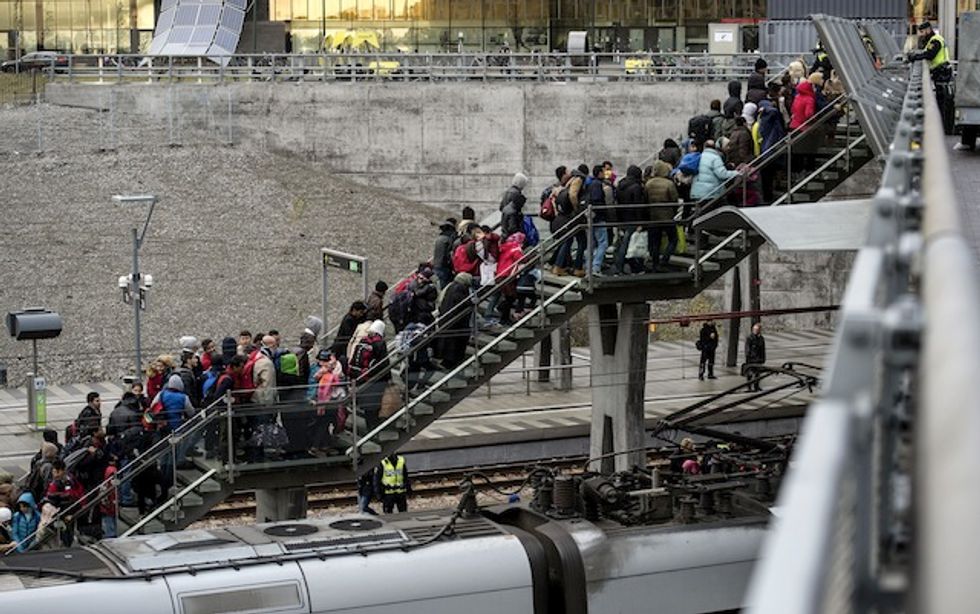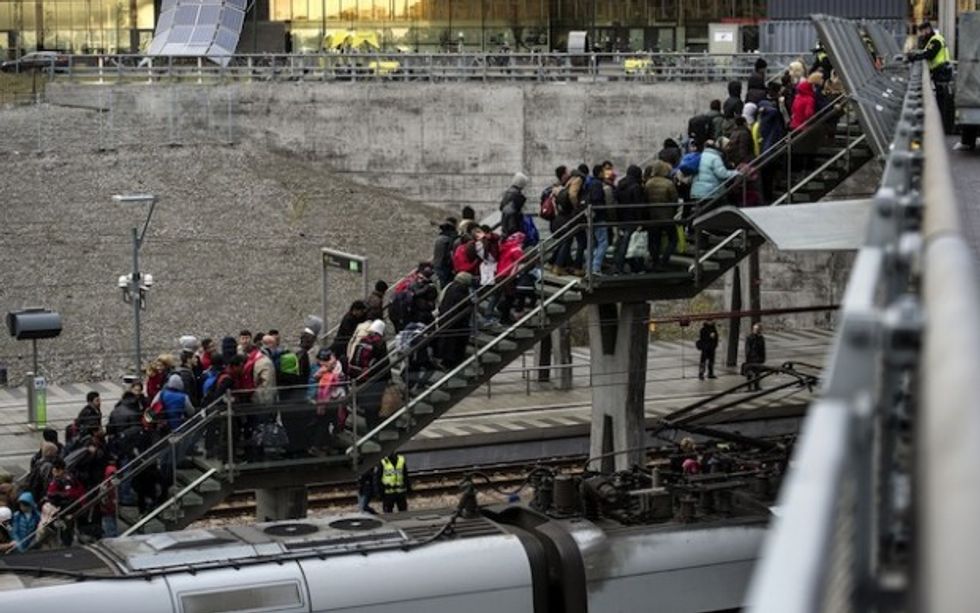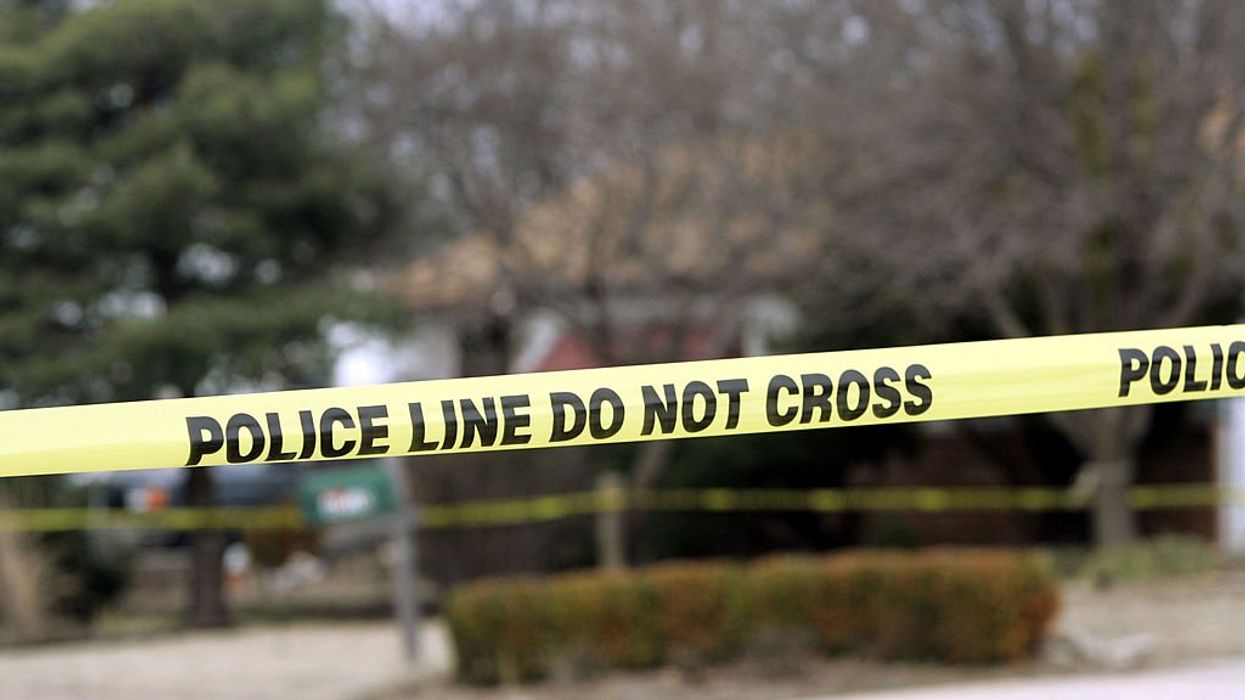In the last year of Barack Obama’s presidency, the world is facing tremendous instability, from the Russian-Iranian onslaught against Aleppo, to the primeval brutality of Islamic State, to the putative ground operation by the U.S. and its Sunni Muslim allies in Syria, to the state meltdowns in Yemen and Libya.
The price in human life, blood and tears is hard to behold.
As the bombings and the battles destroy towns and cities, the survivors begin their trek to the “promised lands” of Europe.
 Police organize the line of refugees on the stairway leading up from the trains arriving from Denmark at the Hyllie train station outside Malmo, Sweden, November 19, 2015. 600 refugees arrived in Malmo within 3 hours and the Swedish Migration Agency said in a press statement that they no longer can guarantee accommodation for all asylum seekers. (Johan Nilsson/AFP/Getty Images)
Police organize the line of refugees on the stairway leading up from the trains arriving from Denmark at the Hyllie train station outside Malmo, Sweden, November 19, 2015. 600 refugees arrived in Malmo within 3 hours and the Swedish Migration Agency said in a press statement that they no longer can guarantee accommodation for all asylum seekers. (Johan Nilsson/AFP/Getty Images)
A million migrants went through the Balkans last year – from Syria via Turkey.
Drowning in the Mediterranean, crossing into Greece, and from there to the borders of Macedonia, Albania and Serbia, to Germany, Austria and Sweden.
International law defines refugees entitled to asylum as those who escape a “well-founded fear of persecution.”
However, among the throngs of refugees from wars, ethnic cleansing, systematic rape, there are also many thousands of economic migrants. Even worse, there are terrorists who blend in with the multitudes, aiming to hurt the Europe that opened its hospitable arms to the persecuted.
Recently, the European Union warned Greece to tighten up border controls – or face sanctions. The uncontrolled migration threatens the Schengen Treaty, the EU’s visa-free regime.
Meanwhile, Greece is shoveling refugees to the border of the former Yugoslav Republic of Macedonia, a land-locked country of only 2.5 million, which goes out of its way to feed, heal, shelter and process them before they continue north. Simultaneously, Greece is effectively blocking Macedonia’s membership in NATO and the EU with childish objections about the country’s name, which hearkens back to ancient Greece and Alexander the Great.
Last year, Macedonia managed to deal with 750,000 refugees. This year, a million are expected. Nothing childish about that.
Some refugees cross over to Albania, one of the poorest and most corrupt Balkan countries, which together with Bosnia-Herzegovina and Kosovo, is one of the three Muslim states in the Balkans. Albanians, mostly moderate of the Sufi tradition, have experienced a rise in extremist penetration and recruitment for Islamic State.
"We need improved intelligence capacities and humanitarian assistance for Albania to ensure the wrong people do not enter the Balkans and Europe, and those legitimately fleeing the conflict zones are vetted and assisted properly,” Ilir Meta, speaker of the Albanian Parliament, told me.
As the pendulum of patience swings back, Europeans are pressing to stem the flow of refugees. Austria has announced that it reached its quota for the year and is imposing border controls.
The Austrian foreign minister has visited Macedonia and promised border security assistance.
Germany has announced that it will lead a NATO naval mission to patrol the Aegean Sea and stop human traffickers.
However, actions speak louder than words. Thus far, Europe and the U.S. have largely paid lip service about helping Macedonia, Albania and other Balkan countries.
Meanwhile, these small and relatively poor countries are the ground zero of a huge security crisis with its epicenter in Syria and Iraq. America’s “leading from behind” has created a vacuum in which Islamic State, Jibhat Al Nusra and other Al Qaeda off-shoots have mushroomed. Together with these Islamists, the Assad regime and its Iranian and Russian allies are generating the refugee tsunami.
To be effective, any strategy to deal with this human disaster requires not only a political settlement in Syria, but also buttressing the Balkans against the human tide threatening to engulf Europe. Any social fabric will end if it cannot absorb newcomers at its own pace.
However, Europe is different. Central and Eastern Europe are uniformly in favor of strictly limiting the number of refugees allowed; and Germany is swinging hard against Chancellor Angela Merkel’s policy of Willkommenskultur (welcoming culture).
Assistance to Macedonia is primarily the job of the European Union. Under the leadership of veteran former Prime Minister Nikola Gruevksi, the small country has achieved impressive results in economic development. According to the World Bank’s Doing Business Index, Macedonia ranks No. 6 in Europe and No. 12 in the world.
Macedonia has worked hard to improved its healthcare and education. It would be unfair to its people– both the Slavic Christian majority and the Muslim Albanian minority– to sacrifice these achievements to the irresponsible migration policies of others.
Moreover, there is a NATO/homeland security aspect of the Balkan refugee crisis. A comprehensive system of fingerprinting, biometric identification and intelligence screening needs to be established before the refugees are sent further into Europe or beyond.
Any suspicion of terrorist activity and extremism should be grounds for deportation. Any lies about identity, geographic origin or circumstances of persecution should be a red flag leading to repatriation. So far, the “filter” against extremism is not fully in place.
Macedonia is also facing political turmoil, as its Social Democratic Party has repeatedly threatened to boycott the parliamentary elections scheduled for April 24. Zoran Zaev, head of the opposition Social Democrats, stands accused of attempted blackmail of former Prime Minister Gruevski by using doctored audio tapes–no Western democracy would tolerate this.
After Gruevski upheld his end of the bargain and resigned, Zaev shows no inclination to run in the elections due to his low polling numbers – a blow to democracy.
The EU and the US should do more to actively support the elections, which would further stabilize the country and the region.
As Macedonia is striving to join NATO and the EU, and Albania, a NATO member, is facing EU accession, the U.S. needs to work with our European allies to provide a soft landing for the Balkan countries and bring them safely into Europe. Doing less in the face of the worst refugee crisis Europe has known since World War II can have disastrous consequences.
Ariel Cohen, PhD, is Director, Center for Energy, Natural Resources and Geopolitics at the Institute for the Analysis of Global Security (iags.org) and a non-resident Senior Fellow at the Atlantic Council
–
TheBlaze contributor channel supports an open discourse on a range of views. The opinions expressed in this channel are solely those of each individual author.


 Police organize the line of refugees on the stairway leading up from the trains arriving from Denmark at the Hyllie train station outside Malmo, Sweden, November 19, 2015. 600 refugees arrived in Malmo within 3 hours and the Swedish Migration Agency said in a press statement that they no longer can guarantee accommodation for all asylum seekers. (Johan Nilsson/AFP/Getty Images)
Police organize the line of refugees on the stairway leading up from the trains arriving from Denmark at the Hyllie train station outside Malmo, Sweden, November 19, 2015. 600 refugees arrived in Malmo within 3 hours and the Swedish Migration Agency said in a press statement that they no longer can guarantee accommodation for all asylum seekers. (Johan Nilsson/AFP/Getty Images)


